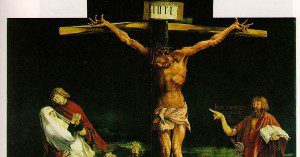Every day is a good day for heresy in the Church, but Trinity Sunday, of course, is the best. The world’s pulpits this morning will be filled with meandering, confused, improbable musings on the divine. Congregations will lean forward, shift uncomfortably, lean back, and stare out the window.* As each preacher finally steps down and resumes the liturgy, a collective sigh of relief will be breathed out over the face of the pew and the post-service coffee. Thank goodness that’s over for another year.
The trouble is, of course, that God is God and we are his creatures, and we can’t see him or know, for the most part, what he is on about. We are obsessed with him—blaming him for all unhappiness and trouble—but strangely dull to the plain things he says about himself in his own scriptures. Indeed, I feel a bit cheeky referring so brazenly to God as “He.” God is the only one who doesn’t get to pick his own pronouns. He will have to make do with however we are feeling in the moment.
I recently had a conversation with someone who is fundamentally disinclined toward any “god” who depends on symbols of any kind to communicate anything. If indeed such a god happened to exist and had anything to say, he should leave the symbols aside and deal straightly and truly. Were such a god to be found, this person would be interested, perhaps, in learning more.
I haven’t been able to walk away from this idea for all the days since. What would God, as I know him now, be like without any symbols? And how would I come to know about him?
The first trouble, I think, is that without symbols I wouldn’t be able to know anyone, least of all myself, because I would have to get rid of language itself. I would have no way to say anything. Each letter stands for a sound, and when joined with other letters, in all different configurations, words, which stand for certain verities, can be formed. When I say ‘cat’ the word refers to the reality of a particular cat, or to all cats in a cosmic sense. But the word is not the thing itself. And there we have done with all the philosophy that I can muster.
We deal in symbols. The sign pointing to my road isn’t the road. It just sits there, complacently, indicating the road and all the houses, and the history of those houses, and the secrets and hearts of all the people living in the houses. Seeing the sign, after only two years of driving by it, I have an irrevocable sense of home, of being already where I was hoping to go.
Certainly God deals in symbols because otherwise we would not be able to climb out of bed in the morning. We wouldn’t have any way to order our lives, our apps, our cupboards, our bank accounts, our gardens, our perception of ourselves and other people. And because God, through the course of human history, keeps coming closer and closer, narrowing the distance between us and himself, bringing the one who was far off near by the blood of the cross, he binds himself to us in the very symbols that constrain our lives. He communicates himself by water and the word, in the bread and wine, as the lamb who sits upon the throne.
I suppose I am free to be disinterested, to prefer a unicorn to the Lamb, a marshmallow to the Eucharist, to bathe in milk rather than water. I could even, I suppose, eschew the use of language, to chuck my computer and phone into the Susquehanna and live purely in nature, with myself only. But God was always free not to bother with me, and he never did. He always comes close, closer than I like, breathing through the chaos and confusion, speaking more clearly than is comfortable.
And one of the things that he says of himself is that he is Love. From before the dawn of time, he loved himself. Not in a cloying, selfish way, the while-I’m-at-it-I’ll-love-myself modern way of self exultation. But rather, the Father and the Son and the Spirit were always pouring themselves out in love, one for the other. The free and total gift of the self for the good and beauty of the other—that was, and is, the Love that God has within the Godhead. And then, for reasons known only to himself, he created the cosmos, the world, the human person. And, though we were ever disinclined to know God as he knows us, he did not spare an inch of himself, but poured himself out utterly to rescue and redeem us. He displayed the kind of Love that he is on the cross.
What a symbol that is. I have the littlest ones trace it out on their bodies. ‘Start at the forehead and say “Father.”’ I move the tentative fat soft toddling hand into place. ‘Put your hand here on your heart and say “Son.”’ The movement, unfamiliar and solemn, feels like one is setting the whole world into motion. ‘Now, move your hand from one shoulder to the other, just as Jesus stretched out his arms on the hard wood of the cross so that you might come within the reach of his saving embrace. Say, “Holy Spirit.”’ What is the sign? The cross. What is the name? God. Now run along and go to church.
*Though not at Good Shepherd where the sermon will be about the text. We’re in John 1.











